A Note on Online Political Subcultures
going postal, the left-wing imageboard + more, thought digest, 09.12.2025
You’re reading default.blog. An emotional scrapbook of the Internet, technology, and the future.
It’s been a weird week, to say the least.
If Internet Studies felt important in 2015 — when the chaos of the news cycle and the flood of misinformation made me want to become a journalist — it has become vital today. The internet is culture now, the way television once was for our parents, our grandparents, maybe even us. Every aspect of our lives flows through it. There’s no such thing as “very Online” or “not Online.”
It’s all of us, all the time, always.
Here’s the paradox: because the internet has become everything, we can’t rely on sweeping generalists. We need people who understand its specific dynamics in a real way. Not self-declared “Internet Understanders” — I keep seeing these ambassadors crop up, claiming to hold the keys to all things online, which is about as useful as declaring yourself a “Culture Understander.” What we actually need are researchers who study particular phenomena in depth: how algorithms shape behavior, how communities form and dissolve, the difference between political extremism and nihilism. Just as we need economists even though “the economy” touches everything, we need experts mapping the internet’s specific effects.
The trouble is, during the critical years when online culture was metastasizing into something larger, too many of the people claiming to study it didn’t do the real work. Journalists especially gravitated to the easy, click-worthy narrative: “right-wing personalities are radicalizing people,” or breathless scare stories about SJWs. They wrote endlessly about figures like Charlie Kirk and Ben Shapiro, acting like they were inspiring violent extremism — or, on the flipside, vilified ordinary people like schoolteachers, in some cases ruining their lives — while missing deeper, more troubling dynamics. Even when reporting was nuanced, it was too little, too late.
Expedient, shareable takes were prioritized over real understanding.
What the flashier, “name brand” Internet extremism writers missed in the intervening years was critical. The phenomenon KiwiFarms calls “Zoomer sadism” — surreal, absurdist cruelty now endemic to so many online spaces, not confined to the right alone. The disembodiment and desensitization that define life for so many under 45. To their credit, some people in academia tried to capture this, but their work was forgotten or ignored.
Today, Ben Collins posted the above on BlueSky. It rubbed the wrong way. Collins is right in a general sense: there are genuine death cults and nihilistic movements spreading across platforms. But he and his ilk rarely wrote about them when it mattered, and the people who did were relegated to fringe media, because those were the only people willing to listen to them.
Since I began writing specifically about online nihilism in 2022, the FBI has even created a new domestic extremism category: NVE (nihilist violent extremism). These aren’t fringe concerns — or even new ones, the Internet didn’t invent this particular despair, it only gave it new outlets — they’re central to understanding what’s happening online.
Political movements absolutely exist online, and I don’t dismiss their importance. But the way we discuss them is flawed. For too long we’ve ignored the media ecology — the reality that these groups grow and thrive in particular online environments. We’ve also underplayed the rise of the political entertainment economy, which exploded during Covid lockdowns.
Back in 2020 and 2021, when I argued that people would shift their politics based on where they could attract the biggest audience, I was laughed out of the room — called stupid. I still get called stupid. But that incentive structure explains a lot. It was a major reason why so many in the “dirtbag left” flipped right. And now we see some of those same figures gravitating toward Nick Fuentes. Is it because their politics have fundamentally changed? Or because Fuentes pulls 150,000 viewers a night? This doesn’t explain everything about political realignment online, but it’s a piece we can’t afford to ignore.
We paint everything with a broad brush when it comes to online culture, especially politics. Commentators treat the “Online Right” as monolithic when in fact it’s always been a fractured ecosystem of incompatible ideologies. It’s home to everything from genuinely hateful extremist groups to mainstream conservative movements that operate within acceptable discourse — yet for over a decade we’ve treated it as a single bloc. Only now, when the cracks are glaring, do we begin to make distinctions, and even then only sometimes.
Terms like “groyper” are thrown around the way “incel” once was — stripped of their specific meaning and history. Monarchists, groypers, MAGA, accelerationists, the Manosphere — these are distinct subcultures with different beliefs, even when they occasionally overlap. The right isn’t innocent of this either: dismissing everyone as “communists” without distinction is equally unhelpful.
Oversimplifications aren’t just sloppy — they actively prevent us from understanding the real dynamics of our 30+ year old online world. They leave us blind to what’s actually happening. What we don’t need are more generalist “Internet Understanders” chasing clout or running interference for whoever’s paying them. What we do need are researchers willing to map specific territories with care.
The good news is many are out there. Here’s a short list of some of my favorites. I’m writing this from a coworking space that’s about to close, so I’m definitely forgetting people — if you don’t see yourself here, it doesn’t mean your work doesn’t matter:
Bx Writes — predator groups and Satanic accelerationism
Aidan Walker — memes
Kate Lindsay — Internet culture and its intersections with pop culture and every day life
I’VE BEEN WATCHING A LOT OF MOVIES LATELY
The Killing of America (1981)
Watching The Killing of America rattled me. The film calls the 20th century “the age of mass murder,” charting how sex killers appeared with terrifying regularity — from once every few years to every few weeks by the 1970s. Killers in the film explain themselves in horrifyingly familiar terms: “I wanted to hurt society where it hurt the most, by taking its most valuable future members.” Another says, simply, “I wanted to be remembered.”
It puts a wrench in my idea that nihilism is simply downstream of the internet. America’s particular strain of nihilism-fueled violence seems rooted in something older: mass media, our culture of radical individualism, maybe the way violence and celebrity have always been entwined here. It’s not just about guns, either, though guns make it worse.
I didn’t expect to cry during the JFK segment, but I did. I’ve seen the footage before, of course, a hundred times, but this time it broke through my desensitization. That’s what the film does: it forces you to feel the brutality of these moments, to see them as real human catastrophes, not as just data.
Murder by Proxy (2010)
Murder by Proxy made me think about mass shootings in a completely different way. The story starts with the postal service — once a stable, respected job, even a community role. But after the restructuring of the 1970s, workers were left demoralized, stuck in mind-numbing tasks on sorting machines, treated like cogs. By 1986, the first “going postal” incident happened, when Patrick Sherrill — a disgruntled Oklahoma letter carrier — killed 14 of his co-workers in a single morning.
What followed was a macabre chain. One shooter in the USPS inspiring another, until a printing-press operator like Joseph Wesbecker, who staged the first major non-postal mass shooting in 1989, admitted he was following Sherrill’s example.
What struck me is that the system responded. Reforms were made, and there hasn’t been a postal shooting since 2006. Why don’t we ask the same questions of schools? What is it about those environments that leaves vulnerable kids demoralized, alienated, desperate? Instead, we fixate on SSRIs — which was also a major object of fascination during postal worker shooters, by the way — missing the environmental conditions that may quietly feed the problem.
What the film calls “murder by proxy” stuck with me, too. You can’t kill “society” itself, but you can kill the people who represent it. In that anger is the desperate belief that “I’m going to be somebody,” if not famous then at least significant. That same drive — to be seen, to be somebody, even through cruelty — is exactly what animates so much of online culture today. The medium has changed, but the motive isn’t new.
The internet turned an old American pathology into something more visible, and more contagious.
THE LEFT-WING IMAGEBOARD
by Anonymous
Imageboards have been known as centers of right-wing ideology, conspiracy theories and memes for over a decade now, but there have also been left-wing imageboard subcultures, and I don't mean the vaguely left libertarian ideology of pre-2012 4chan, I mean imageboards for communists, socialists, anarchists, etc.
If Gamergate organized the Internet into pro- and anti-social justice/wokeism camps from about 2014 on, there have always been dissenters to this polarity, even if they were a small minority. These cultural dissenters are not defined by a particular ideology like “anti-woke” leftism or the now antiquated “dirtbag left,” although certainly some of those people were on /leftypol/, it’s more that these people wanted to maintain the wild West of internet forums while being able to discuss left-wing issues and theory with like minded comrades.
/leftypol/ itself was a product of Gamergate, as it started as the board for discussing left-wing politics on 8chan back in 2014. The very first posters were involved in Gamergate early on before being disillusioned by its capture by right-wing grifters, or were left-wing exiles from 4chan's smaller hobbyist boards like /lit/ (literature). The culture was typical imageboard, and probably the only left-wing forum where people often called others “retards” and “faggots” without being banned.
Due to frequent trolling and spamming from the neighboring right wing /pol/ posters, the n-word was filtered to be “uyghur” as a joke about their similar pronunciation and what was viewed as imperialist Western propaganda about China’s treatment of its ethnic minority. There were and continue to be leftwing sectarian fights about moderation (the question of imperialism was an especially contested issue for banning people), but in general, moderation was much looser than in comparative left-wing forums like on Reddit or Facebook.
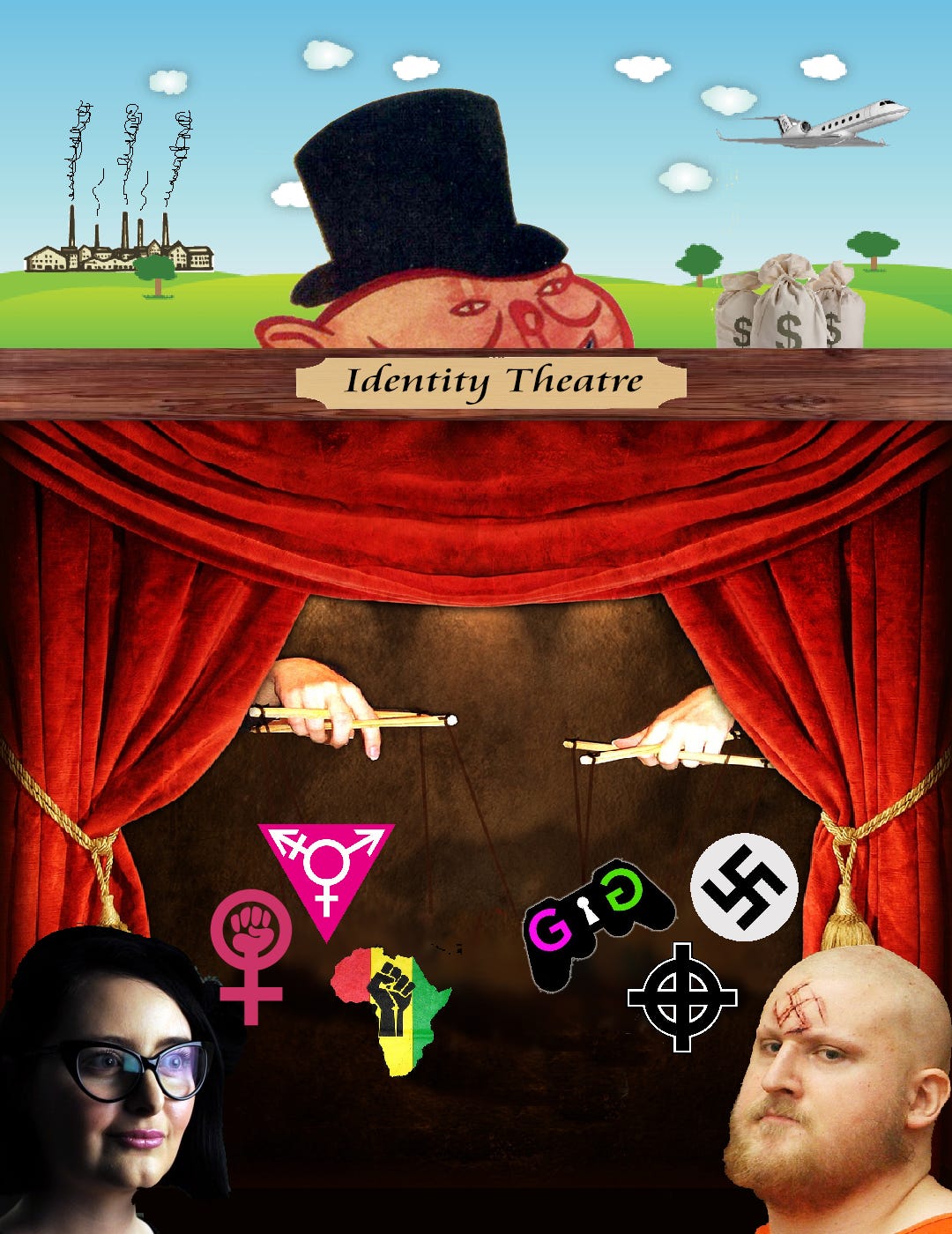
Before the Sanders campaign caused the profile of socialism and Marxism to skyrocket, the user base was mostly anarchist, which is reflected in the board's mascot, a catgirl named Alunya wearing a black and red scarf, her name a pun on Catalunya, the region of Spain that was the base for anarchism during the Spanish civil war.
As time went on the board became more Marxist-Leninist in flavor, and despite being early promoters of Sanders, and had many debates about whether he was secretly a Marxist, they were also among the first to turn on him for perceived weakness and reformism. Like all left-wing sectarian groups, there were many splits, and a bumpy transition to a new site after 8chan went offline. After briefly being hosted on Bunkerchan, there are now two leftypol sites due to differences of opinion about moderation, with the primary site being leftypol.org.
/leftypol/, despite having plenty of shit posting like any imageboard, also had discussions on matters that expected the participants to have read widely on the theoretical topics involved. The popularity in the mid to late 2010s of Max Stirner’s “The Ego and Its Own”, a book of anarchist philosophy that was the topic of harsh criticism by Marx, can partly be attributed to /leftypol/ and the many memes created about it. The board was slow enough that debates about political theory and economics could be continued for days on end, but also anonymous, meaning people were primarily judged by what they posted as opposed to who they were. Even if the user base was more Marxist Leninist, debates about democracy, social democrats and economic planning attracted all points of view on the left, and occasional right wingers also interested in debate.
/leftypol/ is also unusual from other left forums and groups that are described as anti-woke due to its lack of prescribed ideology. Many users will make fun of MAGA Communists, for example, despite them also sharing the same vulgar and offensive linguistic tics. There is no real consensus on what left organization to join or “what is to be done” to put it in Leninist terms, other than, perhaps reading Lenin. There are constant demands by posters to read this or that theorist, some more obscure than others. It's a mix of meme ideologies which shift mercurially, lifelong sectarians, theorycels, teenagers wanting to change the world, cynics and the occasional imageboard user who prefers this ambiance to the reactionary pull of /pol/. Much like its counterpart in /pol/, however, the most popular activity is speculating on how the most recent “happening” such as riots or a stock market crash will bring about the collapse of the US empire.
The typical user base is also the same as other imageboards, of young men and sexual minorities, all of whom happen to share the previously described attributes. A young male communist who grows up in the same internet spaces where all the other degenerate gamers, anime fans and other hobbyists congregate will probably never truly sit comfortably within the politeness of woke society in normal social media, and /leftypol/ remains one of the few places where they don't have to. There is also a sort of memetic rivalry to the broader reactionary imageboard community, however, of wanting to be more sophisticated but also worried about appearing as “soft” and thin-skinned as the woke internet outside. All of these factors combine to produce original content that exists on a spectrum of insightful to schizophrenic.
The impact of /leftypol/ on broader internet culture is often larger than many would anticipate. Its memes are disseminated by accounts run by the forum mods formerly on Facebook and presently on Twitter/X.
Memes that feature “Porky” the capitalist pig, Max Stirner, National Bolshevik (Nazbol) symbols, Albanian bunkers, Italian Communist Amadeo Bordiga, Posadist flying saucers and nuclear bombs, rogue Soviet scientist Lysenko, and several viral text posts originate from there. Streamer Haz Al-Din and head of the MAGA communist “American Communist Party” partly got his start in streaming by analyzing and making fun of /leftypol/ threads. Haz, similarly to the origins of the board, was also significantly changed by the events of Gamergate, being a Marxist at the time disgusted by the anti-GG side of things.
The memes and discourse are intentionally irreverent and anti-moralist but not necessarily ironic in the same way right-wing memes are. A right-wing meme featuring Julius Evola isn't necessarily an invitation to read him, a /leftypol/ meme about Marx, Bordiga, Althusser or Stirner, is basically trying to draft people into reading groups. Memes about former or current actually existing communist states may be more or less ironic depending on just how much of a tankie the author is, but so too is this generally intended in a pedagogical way about anti-imperialism, rather than just using symbols about North Korea, China or the Soviet Union purely to be edgy. Fascists of course also use memes in a pedagogical way sometimes, trying to convince you Hitler wasn't so bad, for example, but most of the time it seems that its the edgy aesthetic that is what really matters.
On a forum like /leftypol/ the edgy for the sake of edgy personalities are treated more like lolcows, and its the strict ideologue who can post pages and pages of arguments and sources who is the ideal, whereas on /pol/ it is the reverse. It is a cult of theory more than a cult of memes, one that just so happens to maintain the rhetorical traditions of old school imageboards.




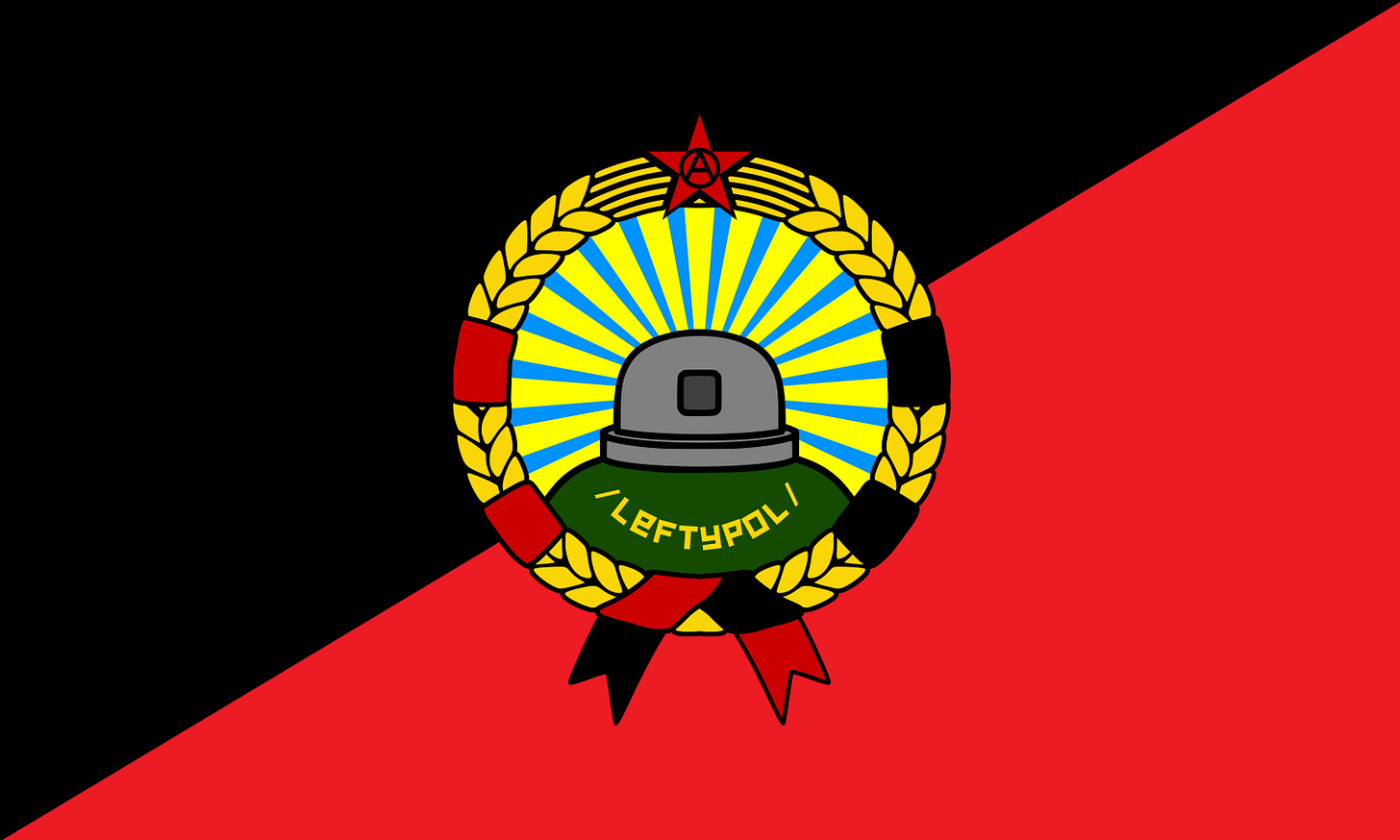

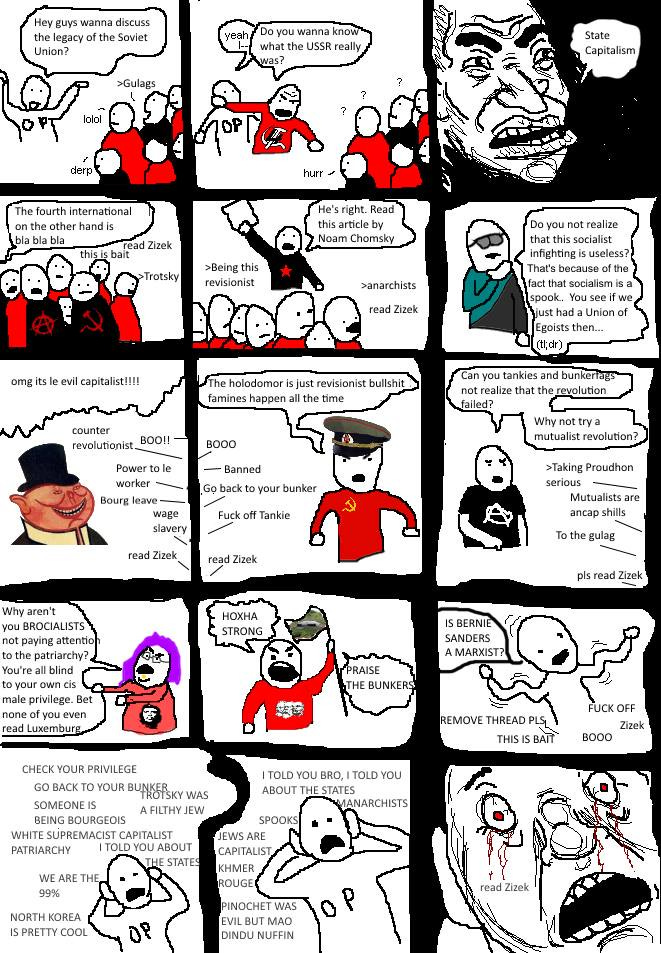
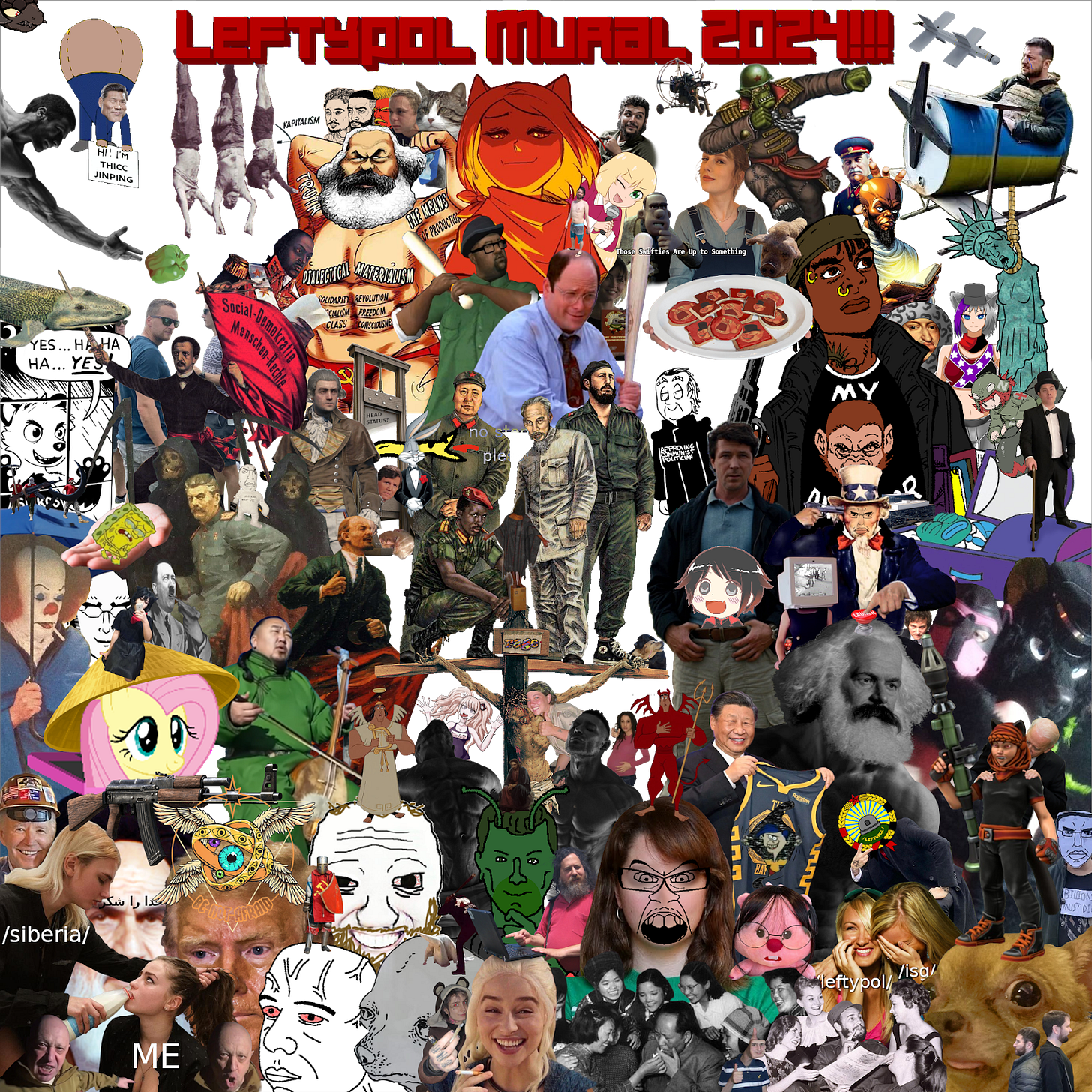
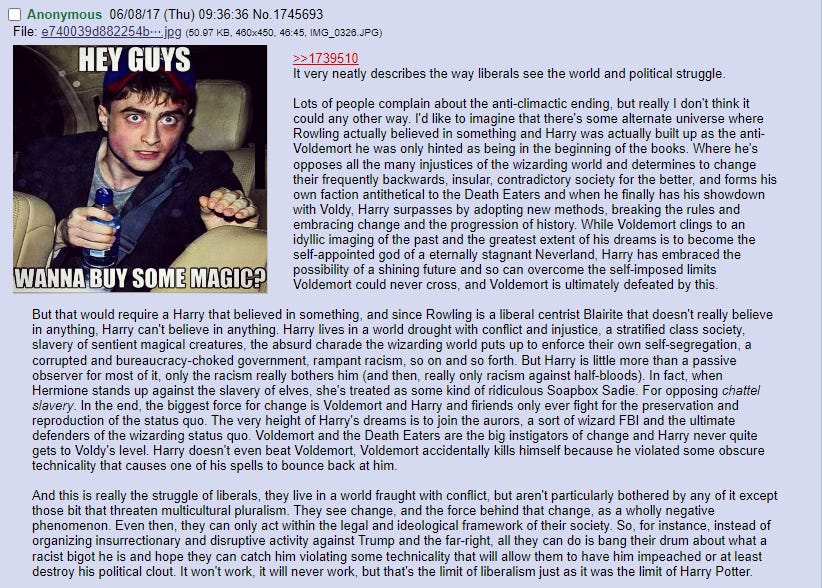



> Reforms were made, and there hasn’t been a postal shooting since 2006. Why don’t we ask the same questions of schools? What is it about those environments that leaves vulnerable kids demoralized, alienated, desperate? Instead, we fixate on SSRIs — which was also a major object of fascination during postal worker shooters, by the way — missing the environmental conditions that may quietly feed the problem.
What I find interesting is that you are one of few thinkers who still thinks that the reason for school shootings is because shooter *lacks* something. Current "woke" thinking is that white male school shooter is lashing out due to "aggrieved entitlement". The problem, the argument goes, is not that they have too little but that they have too much privilege and feel entitled to more.
Such thinkers have been awful quiet since the wave of trans shooters, tho. Because under their logic trans people are privileged now, too.
I would suggest “Strange Rites” by Tara Isabella Burton as she does a great job of tracking the strain of nihilism you mentioned—because it is far older and deeper than most people realize. And “The Culture of Narcissism” but I forget the guy’s name. Also tracks those sinilar trends. They may be helpful in your research; as always, thank you for a great essay.